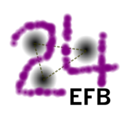Speaker
Description
The first evidence for universality in three-body systems was the discovery by Vitally Efimov of the Efimov effect [1], a remarkable feature of the three-body spectrum for identical bosons with resonant short-range interactions. Nowadays it has been realized that the striking features of the Efimov effect are not restricted to three-body systems, but propagate by increasing the number of particles. The Helium atomic system stands very close to the resonant region, thus we propose a simplified description of the few-body Helium system based on Gaussian two-body interactions. Accordingly, we solved the few-body problem within the lowest hyperspherical harmonic channel, and using constraints on the energy spectrum we estimated the energies of the atomic Helium system for up to N=40 atoms at the unitary limit. For N=3 and N=4 Helium atoms these estimates are compared with the results in [2] obtained by driving the realistic LM2M2 He-He potential towards the unitary limit. To the best of our knowledge, there are no energy calculations at the unitary limit for atomic Helium systems with more that four particles, thus our work provides first estimates for them.
[1] V. Efimov, Energy levels arising from resonant two-body forces in a three-body system, Phys. Lett. 33B (1970) 563.
[2] E. Hiyama, M. Kamimura, Phys. Rev. A 90, 052514 (2014).
